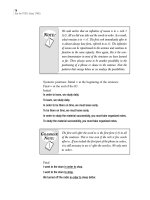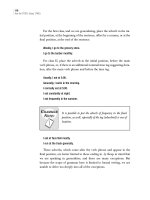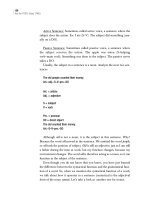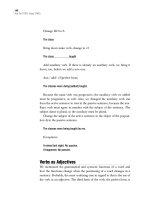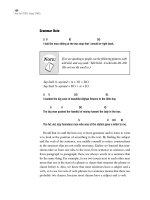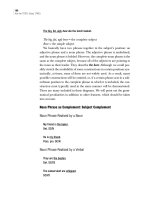Ace the toefl essay part 13
Bạn đang xem bản rút gọn của tài liệu. Xem và tải ngay bản đầy đủ của tài liệu tại đây (148.17 KB, 10 trang )
110
Ace the TOEFL Essay (TWE)
For the first class, and we are generalizing, place the adverb in the ini-
tial position, at the beginning of the sentence, offset by a comma, or at the
final position, at the end of the sentence.
Weekly, I go to the grocery store.
I go to the barber monthly.
For class II, place the adverb in the initial position, before the main
verb phrase, or, if there is an additional nominal time tag suggesting dura-
tion, after the main verb phrase and before the time tag.
Usually, I eat at 5:00.
Generally, I swim in the morning.
I normally eat at 5:00.
I eat constantly at night.
I eat frequently in the summer.
It is possible to put the adverb of frequency in the final
position, as well, especially if the tag (adverbial) is one of
location.
I eat at Taco Bell mostly.
I run at the track generally.
These adverbs, which come after the verb phrase and appear in the
final position, are better limited to those ending in
-ly. Keep in mind that
we are speaking in generalities, and there are many exceptions. But
because the scope of grammar here is limited to formal writing, we are
unable to delve too deeply into all of the exceptions.
THE
:
RE
G
RAMMAR
N
OTE
:
TOEFL Internals flowed 7/13/07 3:36 PM Page 110
111
Parts of Speech
Adverbs of Manner
These describe an action verb and are usually formed by adding -ly to an
adjective. They must modify (describe) an action verb. Some examples
include the following:
quickly, slowly, bitterly, rapidly, resentfully, happily, eas-
ily
, tiredly, eerily, knowingly, and cautiously. These answer the question,
how? or the question, to what degree?
He reluctantly walked home.
He drove slowly.
He answered resentfully.
He ran sluggishly.
He quietly answered.
He resentfully buried his friend.
He answered happily.
The same rules apply here as for the positioning of the adverbs of fre-
quency, except it is wise to avoid the initial positioning, because the
adverbs of manner could be confused with a certain class of adverbials,
possibly leading to logical problems.
Irregular Adverbs
Do not add -ly to fast, hard (if it comes after the verb phrase), and well.
Fast is an adjective and an adverb; therefore, we never add an -ly. Well is
an adverb that describes action verbs, with the exception of the copula
feel, which is not always a copula, but well is used in conjunction with feel
when describing health. Hard is used two ways as an adverb. First, when
used after the verb phrase, it means
much in amount, or it is used to com-
ment on the degree, connoting a worthwhile attempt at doing something
well.
He ran hard. This means that he tried his best. Secondly, when the
word
hard is used as an adverb and placed before the verb phrase, it must
be used with an
-ly. Here, it takes on an opposite meaning than the one
previously mentioned.
He hardly ran. This indicates that he ran a little
and walked a lot, putting forth very little effort. Incidentally,
hard is also
an adjective.
TOEFL Internals flowed 7/13/07 3:36 PM Page 111
112
Ace the TOEFL Essay (TWE)
After the verbs below, use adjectives, with the exceptions noted. These
verbs are copula verbs, which means they fall into the same category as
linking verbs, taking a subject complement that describes and/or renames
the subject. We know a noun or an adjective, which may apply here, too,
realizes the SC.
Copulas: Seem, Appear, Taste, Smell, Feel, and Look
Exceptions: Appear, taste, feel, and look.
It seemed pleasant until the rains came.
She appeared nice. (She was nice [i.e., polite] to us.)
The steak tasted good.
The perfume smelled sweet.
He felt well. (His condition was good.)
She looked pretty.
The exceptions—appear, taste, look, and feel—can be thought out by ana-
lyzing the subject of the sentence. These are exceptions in which we will
use adverbs with
-ly, which means the verbs as used in these sentences are
not functioning as copula verbs (i.e., linking verbs) any longer, but they
are functioning as
lexical verbs, or action verbs.
The woman appeared suddenly.
This means that she came into our view very quickly. If I say she
appeared nice, that suggests she was nice, and I think she may be a nice
person, but I am not certain. Understand that if the subject is a noun that
cannot do anything, we usually need an adjective. For example, the din-
ner appeared nice. It cannot appear suddenly, because the dinner can do
nothing; it is only food.
The same logic is true for
look. She looked nice means she was pretty. If
someone loses her child, I can say she looked frantically. That indicates
how, in what method, she searched for her child. Again, we can analyze
the subject of the sentence, and this may tell us the meaning.
The dress looked great. A dress does not have eyes, so we know that
TOEFL Internals flowed 7/13/07 3:36 PM Page 112
113
Parts of Speech
we must use an adjective after the verb, and it is a copula verb in this
structure. The grammaticality of a structure often depends on the environ-
ment of the diction.
The steak tasted good.
Steak has no mouth, so we need an adjective. Compare that to the next
sentence. He tasted the hot food slowly. The man is capable of eating the
food in a certain manner, so the verb in this context is a lexical one.
In addition to scrutinizing the subject, we can also see if there is a DO.
Copulas do not take DOs, because they are not dynamic, action verbs. He
felt the material carefully.
The material is the DO. What if we say, He felt
around carefully
? Evidently, he is searching for something. Therefore,
around is an adverbial describing where he felt.
Comparative and Superlative Adverbs
These take only action verbs.
Comparative deals with two things, and superlative with three or more.
There are two approaches to this: (1) to use the comparative and superla-
tive suffixes on the end of the adjectival form and (2) to use the words
more
and most + adverb.
Comparative & Superlative Suffixes
Ex(s):
He runs faster than Bob.
He runs the fastest of the boys.
Note the pattern in the first sentence: S–V–Adv–than–N
The pattern is usually: N–Action Verb–Adv +
-er–than–N (comparative)
S–Action Verb–(
the) _____ + est (superlative)
Several cues indicate a superlative: (1) the word
the before the superla-
tive phrase; (2) the use of present perfect after the superlative phrase; (3)
the use of a prepositional phrase after the superlative phrase, generally
employing the prepositions
of and in.
Examples:
TOEFL Internals flowed 7/13/07 3:36 PM Page 113
114
Ace the TOEFL Essay (TWE)
1. He types the slowest.
He answers the quickest.
2. He runs the fastest I have ever seen.
He talks the fastest I have ever heard.
3. He types the slowest of the boys. (specific subset)
He answers the quickest in the entire class. (all-inclusive category)
More & Most + Adverb
He types more slowly than Bob.
She answers more astutely than her sister.
He types the most slowly.
She answers the most astutely.
He runs the most slowly of all the boys I have seen.
She answers the most adeptly of the girls I have seen.
He works the most diligently of the boys.
He works the most efficiently in the whole class.
It is permitted to say, She works more diligently than
the other girls in the class
. This is correct, because we
have separated the entire class into three groups: her, the
other girls, and the remainder of the class (presumably
boys); therefore, she is not the best. The comparison is, how-
ever, only between her and the other girls.
THE
:
RE
N
OTE
:
TOEFL Internals flowed 7/13/07 3:36 PM Page 114
